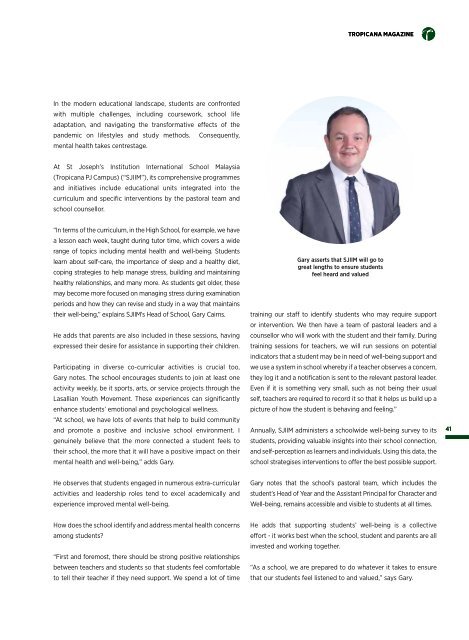Tropicana September-October 2023 #150 The ESG Issue
Tropicana Magazine September-October 2023 #150 The ESG Issue
Tropicana Magazine September-October 2023 #150 The ESG Issue
Create successful ePaper yourself
Turn your PDF publications into a flip-book with our unique Google optimized e-Paper software.
TROPICANA MAGAZINE<br />
In the modern educational landscape, students are confronted<br />
with multiple challenges, including coursework, school life<br />
adaptation, and navigating the transformative effects of the<br />
pandemic on lifestyles and study methods. Consequently,<br />
mental health takes centrestage.<br />
At St Joseph’s Institution International School Malaysia<br />
(<strong>Tropicana</strong> PJ Campus) (“SJIIM”), its comprehensive programmes<br />
and initiatives include educational units integrated into the<br />
curriculum and specific interventions by the pastoral team and<br />
school counsellor.<br />
“In terms of the curriculum, in the High School, for example, we have<br />
a lesson each week, taught during tutor time, which covers a wide<br />
range of topics including mental health and well-being. Students<br />
learn about self-care, the importance of sleep and a healthy diet,<br />
coping strategies to help manage stress, building and maintaining<br />
healthy relationships, and many more. As students get older, these<br />
may become more focused on managing stress during examination<br />
periods and how they can revise and study in a way that maintains<br />
their well-being,” explains SJIIM’s Head of School, Gary Cairns.<br />
He adds that parents are also included in these sessions, having<br />
expressed their desire for assistance in supporting their children.<br />
Participating in diverse co-curricular activities is crucial too,<br />
Gary notes. <strong>The</strong> school encourages students to join at least one<br />
activity weekly, be it sports, arts, or service projects through the<br />
Lasallian Youth Movement. <strong>The</strong>se experiences can significantly<br />
enhance students’ emotional and psychological wellness.<br />
“At school, we have lots of events that help to build community<br />
and promote a positive and inclusive school environment. I<br />
genuinely believe that the more connected a student feels to<br />
their school, the more that it will have a positive impact on their<br />
mental health and well-being,” adds Gary.<br />
Gary asserts that SJIIM will go to<br />
great lengths to ensure students<br />
feel heard and valued<br />
training our staff to identify students who may require support<br />
or intervention. We then have a team of pastoral leaders and a<br />
counsellor who will work with the student and their family. During<br />
training sessions for teachers, we will run sessions on potential<br />
indicators that a student may be in need of well-being support and<br />
we use a system in school whereby if a teacher observes a concern,<br />
they log it and a notification is sent to the relevant pastoral leader.<br />
Even if it is something very small, such as not being their usual<br />
self, teachers are required to record it so that it helps us build up a<br />
picture of how the student is behaving and feeling.”<br />
Annually, SJIIM administers a schoolwide well-being survey to its<br />
students, providing valuable insights into their school connection,<br />
and self-perception as learners and individuals. Using this data, the<br />
school strategises interventions to offer the best possible support.<br />
41<br />
He observes that students engaged in numerous extra-curricular<br />
activities and leadership roles tend to excel academically and<br />
experience improved mental well-being.<br />
Gary notes that the school’s pastoral team, which includes the<br />
student’s Head of Year and the Assistant Principal for Character and<br />
Well-being, remains accessible and visible to students at all times.<br />
How does the school identify and address mental health concerns<br />
among students?<br />
“First and foremost, there should be strong positive relationships<br />
between teachers and students so that students feel comfortable<br />
to tell their teacher if they need support. We spend a lot of time<br />
He adds that supporting students’ well-being is a collective<br />
effort - it works best when the school, student and parents are all<br />
invested and working together.<br />
“As a school, we are prepared to do whatever it takes to ensure<br />
that our students feel listened to and valued,” says Gary.















